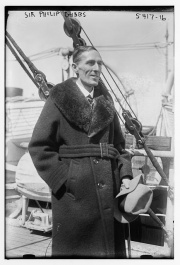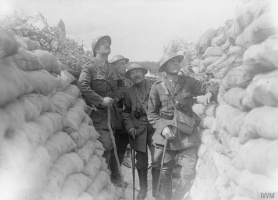Early Life↑
The son of a London civil servant, Philip Gibbs began his career working in publishing. Although he spent much of his career with newspapers as a reporter and literary editor, he was also an accomplished novelist and writer. He began working for London newspapers in 1902, first briefly for the Daily Mail, followed by the Daily Express, and then for the Daily Chronicle, with which he stayed. His first experience of war reporting came in the First Balkan War of 1912, covering the Bulgarian Army, which made his reputation for writing vivid and compelling accounts of the fighting.
World War I↑
On the outbreak of the First World War, the British government imposed a system of censorship on London newspapers. Unexpectedly, reporters were forbidden to accompany the British Expeditionary Force (BEF) to France. Gibbs travelled to France with other reporters and caught up with elements of the British forces in Belgium. He wrote a few pieces before, like all other British reporters, he was forced to leave the war zone. The British Army then tried a brief experiment of excluding all reporters from the Western Front, relying instead on issuing communiqués. This experiment proved impractical largely due to opposition from the London newspapers, and in May 1915 Gibbs became one of five officially accredited war correspondents to join BEF General Headquarters. By agreement with their newspapers, the reporters were strictly controlled and their reports were censored; they were given daily briefings at GHQ, and they were sometimes allowed to the front to conduct interviews. The personnel and number of official correspondents at GHQ varied slightly during the war, but Gibbs stayed there throughout except for occasional rest breaks.
Reporting↑
Gibbs’s reports were published in the Daily Chronicle and the Daily Telegraph, and given worldwide syndication through the New York Times. An intelligent and observant man of liberal political principles, Gibbs strongly disliked war (although he was not a pacifist) and was privately critical of the abilities and mentality of many British senior officers. He accepted the restrictions under which he worked as part of his patriotic duty and because he had no choice. He specialized in writing vivid accounts of ordinary soldiers in battle (described by an officer at GHQ as “horror-mongering stuff”[1]), but without any wider criticisms. He kept his real views for occasional contacts with important figures, such as his influential discussion with David Lloyd George (1863-1945) during the Third Battle of Ypres (Paschendaele) in 1917. Three collections of his dispatches were published during the war, The Soul of War (1915), The Battles of the Somme (1916) and From Bapaume to Passchendaele (1918), followed by his post-war memoirs, Now It Can Be Told (1920). He was knighted for his work as an official correspondent in 1920. For the remainder of his career he worked occasionally as a freelance journalist, novelist and travel writer, and returned very briefly to war reporting in 1939-1940 before finally retiring.
Stephen Badsey, University of Wolverhampton
Section Editor: Jenny Macleod
Notes
- ↑ 'If we check Philip Gibbs writing his "horror-mongering stuff" we shall have his paper down our throat.' - Brigadier-General John Charteris, chief of Intelligence at General Headquarters of the British Expeditionary Force, 16 September 1917, as quoted in his own book of memoirs: John Charteris, At G.H.Q., London 1931, p. 254.
Selected Bibliography
- Badsey, Stephen: The British Army in battle and its image 1914-18, London 2009: Continuum.
- Farrar, Martin J.: News from the front. War correspondents on the Western Front, 1914-18, Thrupp 1998: Sutton Publishing.
- Gibbs, Philip: Now it can be told, New York; London 1920: Harper & Brothers.
- Gibbs, Philip: The pageant of the years, London; Toronto 1946: W. Heinemann.









